Introduction
Culture is defined as people’s ways of doing things in the organization. It refers to the values, mores, dexterities, practices, outlooks, and history of the people working in the organization.
The above aspects affect the operations of the organization in a number of ways. In particular, it determines whether the organization would achieve its objectives or not. In this article, the above aspects are analyzed to establish how they affect the performance of projects (Larson, & Gray, 2011).
In particular, three aspects are discussed in detail, including cross-cultural consideration, ethics, and the influence of international factors. The article talks about some of the opportunities and pitfalls presented by the three cultural factors. The last section of the article discusses some of the solutions that could be applied in resolving cultural problems experienced in organizations.
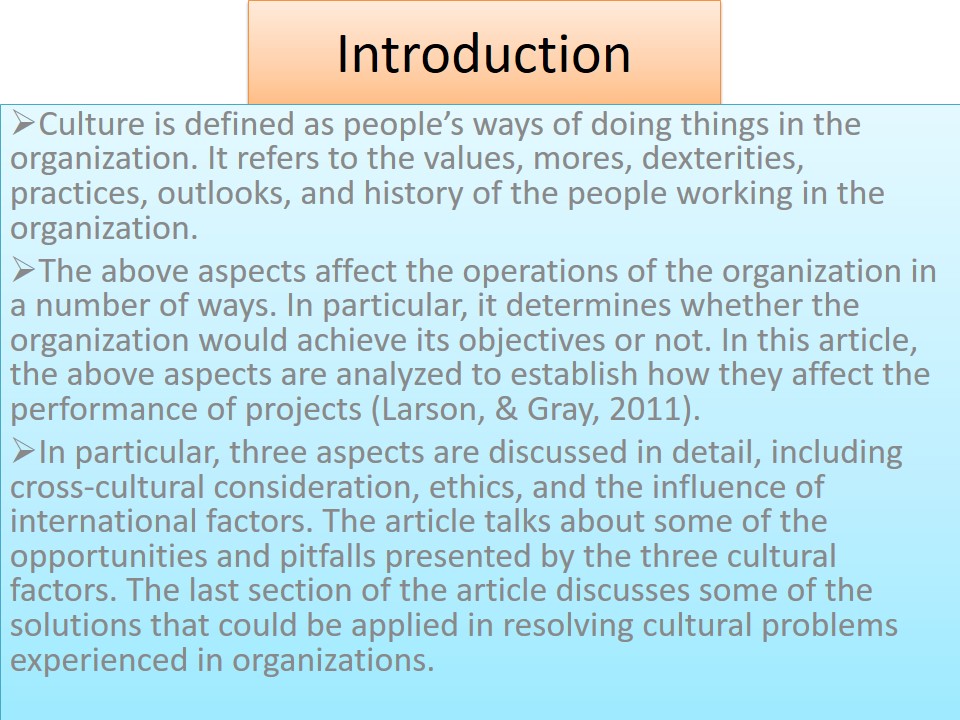
Ethics
Moral codes play an important role in project management because they offer both opportunities and pitfalls.
Without ethics, the project coordinators cannot gain the support of the project team. Moral principles in project management include values, beliefs, and rules that are held dearly by individuals (Hamilton, 2004).
In project management, profit and staff stimulus are frequently considered supreme. The management of any project should always remember to be corporate citizens in order to avoid brushing shoulders with the law.
They should be responsible employers and encourage their employees to be responsible as well.
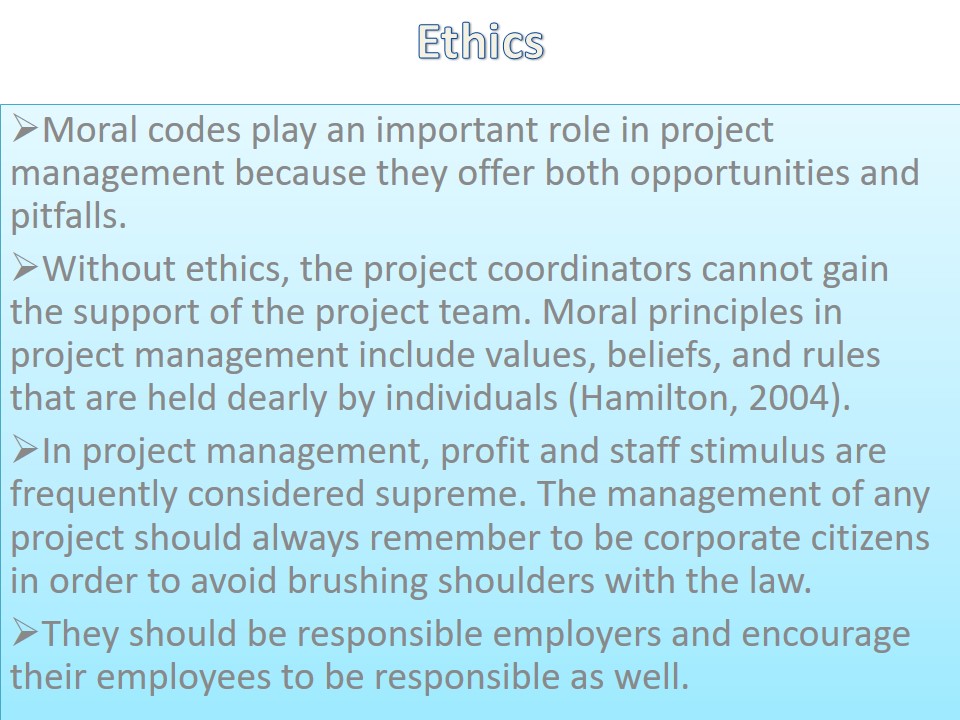
Opportunities and Pitfalls
- Opportunities:
- In project management, ethics present a number of opportunities. Some of them are listed below:
- Ethics would definitely satisfy the basic needs. This is because being fair, honest, and ethical would encourage team members to work hard to achieve their ambitions.
- Ethics generate trustworthiness for the organization.
- Ethics are beneficial to the organization in the sense that it unites people.
- Finally, ethical management facilitates decision-making process.
- In project management, ethics present a number of opportunities. Some of them are listed below:
- Pitfalls:
- In project management, ethics demand that the manager or the management takes responsibility for any mistake done by junior officers.
- It is ethical that the manager resigns or calls off the project in case he or she realizes that the objectives of the project are not being achieved. This is a disadvantage because the manager might not be aware of any mistake being committed by a junior officer.
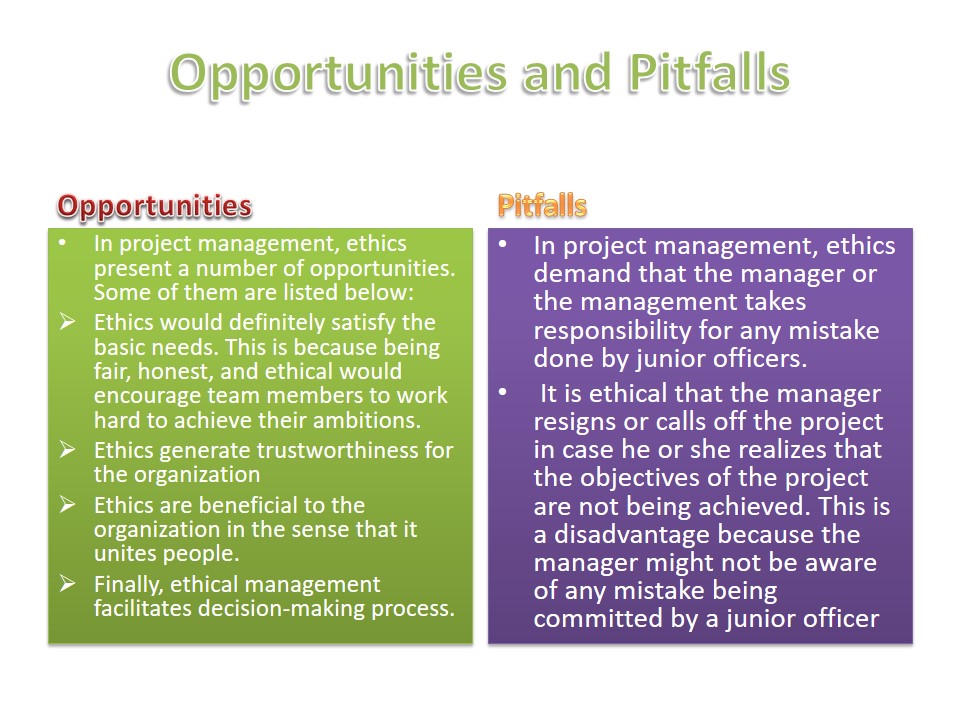
International Factors
International factors play a critical role in determining the success of any project. International donors, who might be very strict on the deadlines and how finances are used, often fund projects.
International factors influence the skills and knowledge selection. Organizations working under the influence of international forces should be competent in order to ensure success.
Organizations engaging in project management are forced to come up with the right projects that would attract foreign funding. Moreover, they try to select the right project partners to avoid any controversy with international donors. In this regard, project managers should have the ability to select, develop, and support the staff in order to achieve the objectives of the project. The project managers should be capable of making cross-border collaborations. This requires adequate skills and flexibility.
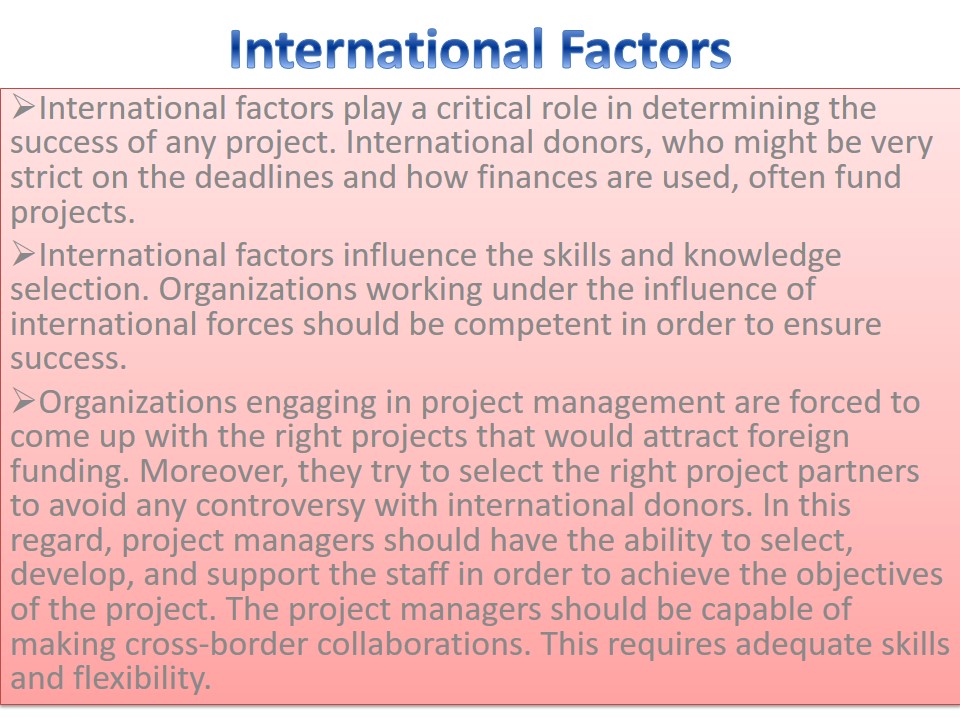
Opportunities and Pitfalls
- Opportunities:
- International factors allow the project manager to be vigilant, particularly in terms of time and risk.
- The two factors enable the project manager to plan effectively and execute the project within the stipulated period. As the management would be trying to executive the project, it would also be risk-averse implying that the managers will come up with strategies aimed at boosting the project.
- International factors present opportunities to the project because the management will think about the following:
- Complexity of the project.
- The infrastructural design of the project.
- Risks involved.
- The issue of time.
- Objectives.
- Pitfalls:
- International factors on the other hand present some disadvantages to the project. One of the challenges is that project implementers must consider the complexity of the project.
- Projects supervised by international forces usually encounter legal and political barriers as compared to local projects. Other pitfalls include, differences in cultures between project donors and managers, and the issue of language.
- In this regard, the management is expected to come up three strategies, including proper selection of projects, effective selection of partners, and offering extra-ordinary leadership.

Multicultural Consideration
Cross-cultural consideration is very important as far as the successes of projects are concerned.
It provides the project team with an opportunity to gain adequate experience and innovative thinking. This would definitely improve the perceived success of the project. In a multicultural global setting, cultural differences are known to interfere with the completion of projects.
It is therefore recommended that project managers should be sensitive to people’s beliefs, values, and standards. The project leader should advocate for creativity and motivate the staff through flexible leadership style.
Cultural differences take various forms. It could be differences between individuals or groups. In some cultures, individualism is advocated while in others collectivism is perceived to be ethical. These differences affect people’s attitudes towards time management.
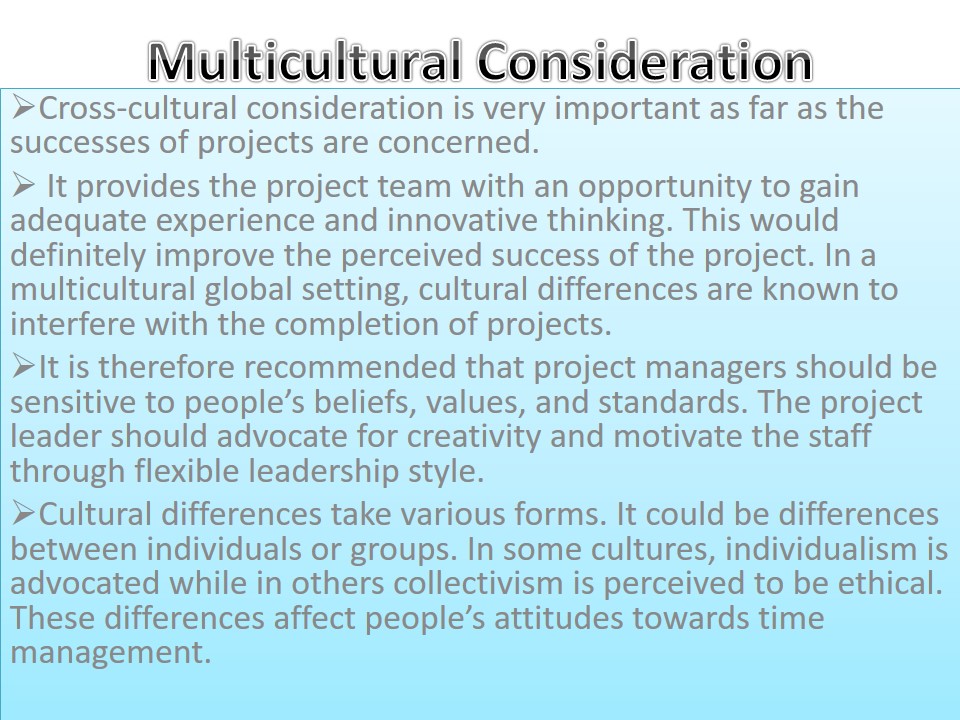
Opportunities and Pitfalls
- Opportunities:
- If embraced in project management, it would small groups in realizing their goals and objectives in the organization. Inequality in organizations affects the effective implementation of policies, which might have a detrimental effect on the project.
- Cultural consideration in project management enables leaders to come up with strategies aimed at avoiding uncertainties. In project managers, some groups feel that their positions are not fully recognized.
- Even though some groups feel that they should be allowed to perform their duties independently, cross-cultural policies would allow project managers to supervise projects.
- Pitfalls:
- Cross-cultural consideration brings in the aspect of control in projects, which is sometimes considered the cause of failure for various projects.
- It is believed that culture controls every aspect of life, including the immediate environment. Cross-cultural consideration presents opportunities for discrimination of certain groups in projects.
- For instance, women are often incorporated in projects as underdogs. Each culture believes that masculinity is associated with assertiveness, toughness, and success. On the other hand, women are associated with overreliance on men.
- They cannot make decisions on their own. This presents an opportunity for discrimination based on gender.
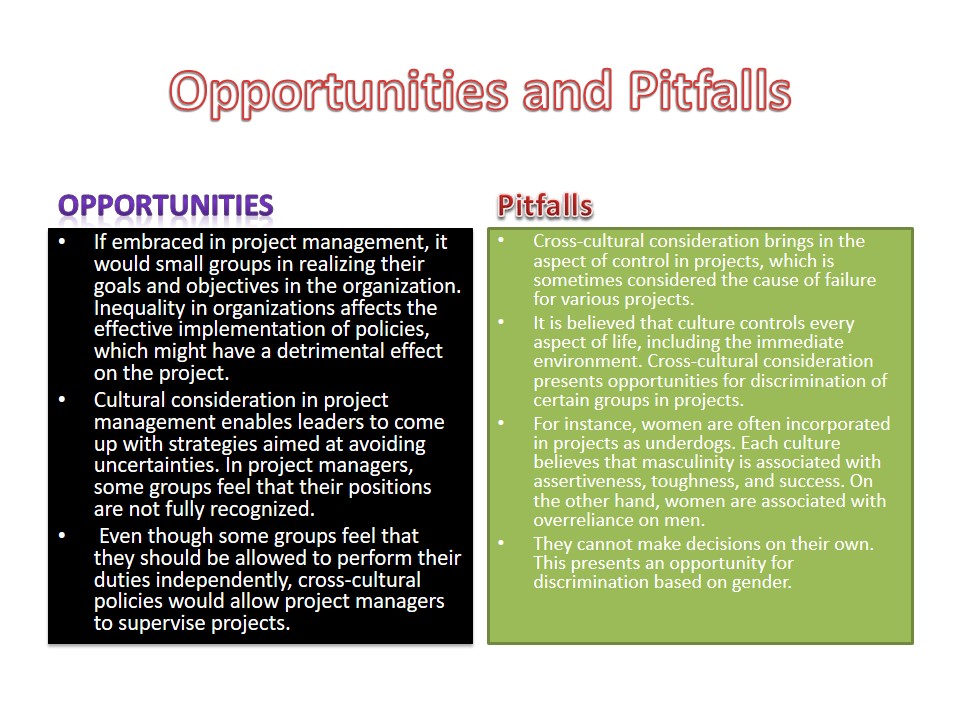
Solutions
Solutions to Ethical problems
- In the professional world, the project managers will always want to excel in their work.
- Therefore, some strategies must be formulated to counter the possible effects of ethics, international ethics, and cultural practices. Ethically, the project manager should always strive to ensure that customer’s finances are utilized in the best way possible.
- In this regard, the manager must come up with strategies aimed at motivating staff and stamping out malpractices such as corruption and fraud. Each member of staff should be accountable to the organization meaning that no funds should be used without giving a proper breakdown (Morgen, 2003).
- Project managers must always provided solutions to problems. For instance, the manager must be willing to provide alternatives in case things go through.
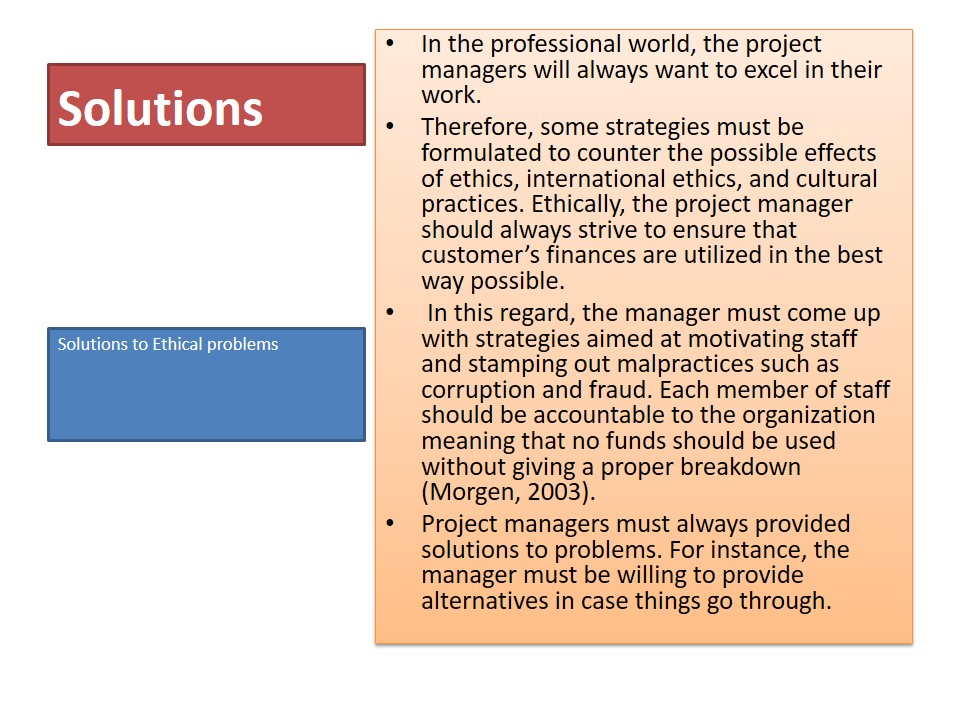
Solutions to forces emanating from International factors
- For the management to handle the influence of international forces, documentation should be embraced in all departments of the organization.
- In fact, it would be difficult for the donors to pin down the project manager if all documents are available.
- Even if the project does not succeed, the manager cannot be taken to court because he or she can account for the funds allocated to the organization (Dinsmore, 2005). .
- Some donors would want to know how the organization operated during the entire life of the project. To please international donors, project managers must always be ethical.
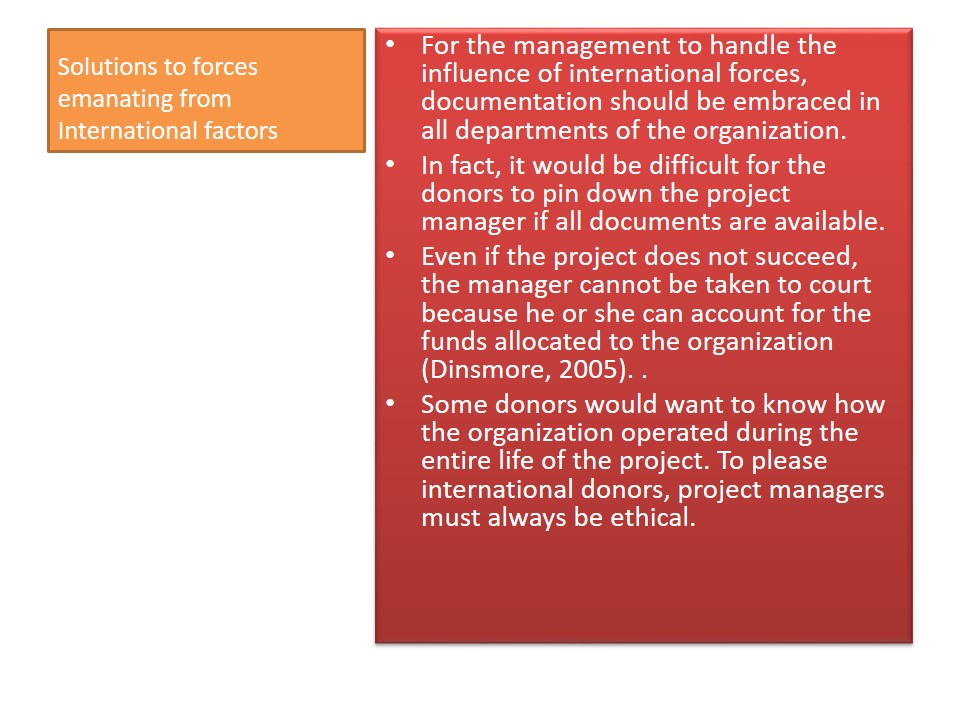
Solutions to problems related to cultural aspects
- Regarding cultural aspects, the project manager should always distance him or herself from cultural practices that oppress a section of the organizational members.
- The management should always advocate for cultural diversity in the organization, by urging members to tolerate the values of others. For instance, the project manager can simply ignore the existence of individuals perceived to be practicing weird cultures.
- In organizations, homosexuals should be allowed to exercise their rights without stigmatization. It is the role of the project manager to ensure that cultural differences do not affect the objectives of the project. Minority groups, such as women, should be allowed to participate fully in the execution of the project.
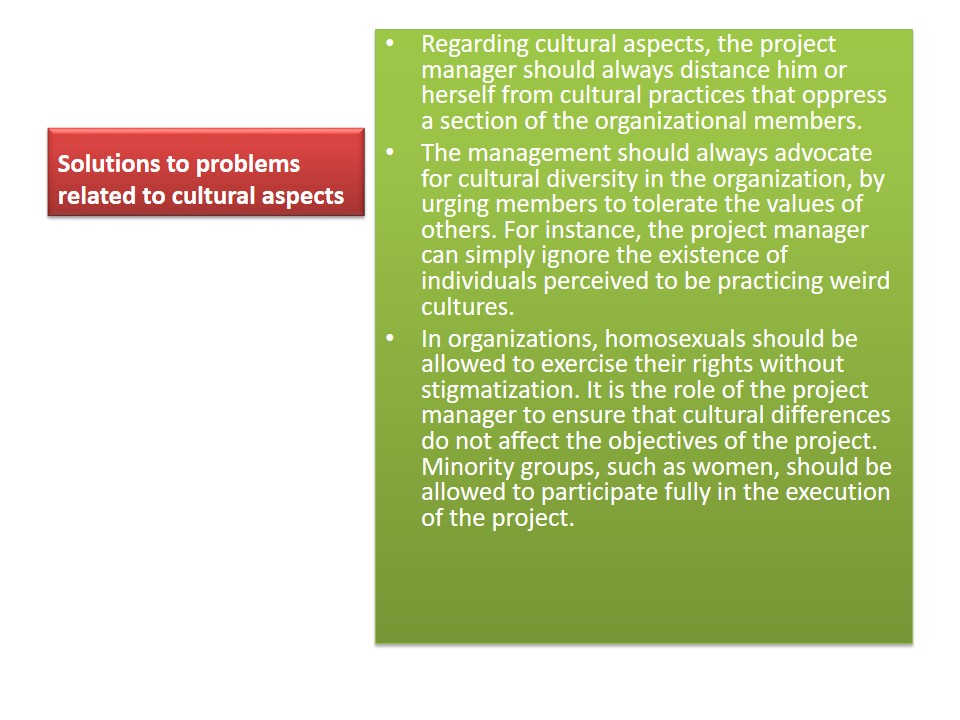
References
Dinsmore, P. (2005). The right projects done right!. New York: John Wiley and Sons.
Hamilton, A. (2004). Handbook of Project Management Procedures. New York: TTL Publishing Ltd.
Larson, E.W., & Gray, C. F. (2011). Project Management: The Managerial Process (5th ed.). New York: McGraw-Hill.
Morgen, W. (2003). Fifty key figures in management. New York: Routledge.